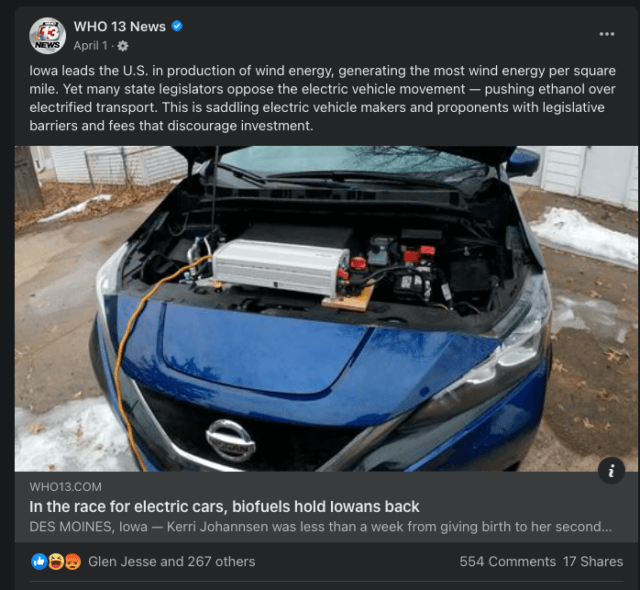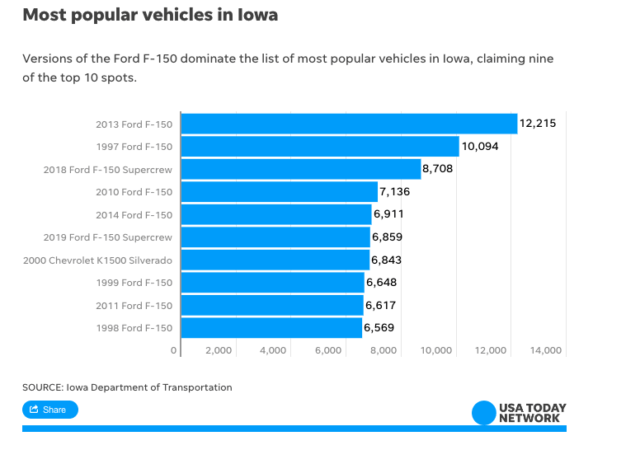
Over the last few months, the Starting Line team has noticed an interesting trend in Iowa social media: Stories about electric vehicles drive huge engagement and draw intense debate among supporters and detractors, mostly on Facebook.
And while wild comment threads on Facebook stories is nothing new, the sheer ferocity on EV-related stories, even if it’s a routine, bland article, has become noteworthy.

Not surprisingly, a lot of people’s viewpoints on electric vehicles (EVs) tend to fall in line with where they lie politically; people on the left seem in favor of them while folks on the right, more often than not, seem to hate the very idea that they exist.
The animosity for these vehicles can be perplexing. Here are some of the comments from an electric vehicle story WHO 13 News shared in April:


You could scroll just about any EV story shared by an Iowa media outlet and see similar remarks.
The uptick in animosity toward electric vehicles also seems to coincide with the Biden Administration’s push toward them, Iowa’s Republican leaders’ resistance toward embracing EVs, and Fox News coverage that paints the vehicles in a negative light.
While Fox News has not heavily pushed an anti-EV agenda, it has applied its megaphone to the issue:

Some Fox News headlines about electric vehicles from the last year include:
- “Pete Buttigieg blasted for touting ‘benefit’ for electric vehicle owners from ‘pain’ of high gas prices”
- Oversight Republicans warn Biden’s electric vehicle push will benefit China and hurt American jobs
- Biden officials push electric cars on recession-weary Americans from their ‘policy fantasyland’: expert
Even a Fox News story on the Sept. 27 announcement about the US Department of Transportation approving states’ electric vehicle infrastructure plans dedicated a lot of room to talk about how most states are unprepared for an influx of EVs and tied them to elitism:
“Currently, electric vehicle owners charge their vehicles at home 80% of the time, typically at single-family houses,” the article says. “But that is likely to change as the less affluent who don’t have a garage to house a charging station buy EVs.”
The elitism argument is an interesting one because it can be convincing. The average price of a new EV in 2022 is nearly $67,000, which is about the same average price people paid for a new luxury vehicle, according to Kelley Blue Book. However, they are getting cheaper, with the starting price for a Chevrolet Bolt is just under $27,000, while several other brands have options in the mid-$30,000s.
Notably, that average price of an EV is only slightly higher than the sticker price of a new full-size pickup truck, which retails for $62,470, according to same Kelley Blue Book article. And do you have a guess as to what is the most popular vehicle in Iowa? The Ford F-150, a full-size pickup truck.

Other anti-EV talking points we’ve seen on Iowa social media include:
- The batteries are made in or are sourced from China/how do you dispose of dead EV batteries?
- They won’t perform well in winter.
- Electric grids aren’t prepared for them.
- Not practical in rural areas.
- EVs are part of a forced climate change agenda/The Green New Deal.
- Why should the government pay for charging stations/offer EV tax credits?
While some of the talking points do raise valid questions about the practicality of EVs in certain spaces, what if it simply boils down to people on the right hate EVs because lefties like them?
‘We all judge’
Dr. Dave Peterson, a political science professor at Iowa State University, noted cars, like a lot of things, are increasingly becoming more a part of people’s political identities.
“The car you drive now is a signal of your cultural stance on a whole bunch of different things,” he said. “That sort of what’s been tied into a lot of this animosity toward electric vehicles.”
Peterson said your vehicle is one of the ways you are most visible and some people use them to deliver a message about themselves and where they stand to the world. He noted that people used to look at people who drove Hummers in a certain light and people create similar mental images for folks who drive a Tesla or a Prius.
“We all judge other drivers; we’re constantly judging other drivers,” Peterson said. “We are judging them for their bumper stickers, for the ways they drive, and it’s becoming more the case that we’re judging them for what they drive.”
Peterson said the fight over EVs, which he described as “weird,” is part of an ongoing shift in how people identify themselves through their political beliefs.
“Being a Republican or being a Democrat, that wasn’t necessarily as synonymous with our faith tradition and the way we understand gender roles, the way we understand gender, race, class, all these sorts of things,” he said.
“Over time, all of those identities have aligned so now all of these things tend to go together. So when somebody is of the other party, that becomes acute; that becomes a shortcut for us that they are different from me on all of these different things.”
What about Tesla?
Another interesting wrinkle in the right’s disdain for EVs is the Elon Musk factor.
The biggest electric car brand in America is Tesla, which is led by Musk. The Tesla CEO has become a scourge to liberals and a hero to folks on the right who see him as a champion of freedom and free speech.
Even Chuck Grassley, Iowa’s senior Republican senator and a prolific tweeter, expressed his support of Musk’s attempt to purchase Twitter earlier this year.
Grassley is also one of the biggest advocates for ethanol and has noted the threat EVs present to the biofuel sector on more than one occasion.
Biden said in Detroit Friday that he’s going to build thousands of electric car charging stations across America That’d b the end of ethanol (and gasoline) Progressive policies like this & the green new deal would b crushing to Iowa agriculture
— Chuck Grassley (@ChuckGrassley) October 17, 2020
But does any of that matter when it comes to Elon?
“I don’t think they really care about how Musk got his money,” Peterson said, referring to Musk’s fans on the right who hate EVs. “I think they care about the ways in which Musk is fighting people on Twitter.
“The enemy of my enemy is my friend at some point and I think that’s sort of the key thing when they’re thinking about Musk.”
‘It’s Corn’
In Iowa, it’s reasonable to assume this animosity is ramped up because EVs are seen as a direct threat to ethanol (see the above section).
It also probably doesn’t help that the state of California and Biden, both key boogeymen for Iowa Republicans, have embraced EVs so much.
The Hawkeye State leads the nation in the production of biofuels, including ethanol, which consumes 57% of Iowa’s corn crop.
“Ethanol was supposed to be the path toward domestic oil production, domestic fuel production, and, we’ve moved,” Peterson said. “The economy and the nature of cars is shifting towards electric vehicles and some gets tied into this threat to sort of the agricultural economy of the state.
“I don’t know how much of that is real—how much of a real threat that is—but I think it is perceived as and seen as this threat to the way the ag economy has moved.”
Iowa and corn are as synonymous with each other as coal is to West Virginia, which Peterson used to provide a comparison of how those two industries are central parts of each state’s respective identity.
“There aren’t that many people in West Virginia anymore employed by the coal industry, but any attempts to modernize electric production, power production is seen as this existential threat to the coal history of the state,” he said.
“That seems to get tied up into part of what’s going on in Iowa.”
by Ty Rushing
10/05/22
To contact Senior Editor Ty Rushing for tips or story ideas, email him at ty@iowastartingline.dream.press or find him on Twitter @Rushthewriter
Iowa Starting Line is part of an independent news network and focuses on how state and national decisions impact Iowans’ daily lives. We rely on your financial support to keep our stories free for all to read. You can contribute to us here. Also follow us on Facebook and Twitter.

5 Comments on "How The Right’s Hatred Of Electric Vehicles Is Growing In Iowa"
Thank you, Ty Rushing. I don’t generally follow Iowa social media, so this information is new and interesting. I’d also be interested in Iowa social media attitudes toward solar and wind energy.
Iowa is more ruled and dominated by Big Corn than North Carolina was ever dominated by Big Tobacco. And the Big Ag/Big Corn PR machine never stops chugging. Examples are everywhere, one being last week’s U of I football game.
One of my neighbors drives a Tesla. I will likely never own one but certainly wish them well – after all its “freewill.” Not too many middle class Iowans will be driving a $75,000 automobile, especially in these inflationary times. Don’t understand the anger or resentment for those who choose this option. Live and let live. If I drive a vintage gas guzzler that’s my choice – not govt or my neighbors.
“what if it simply boils down to people on the right hate EVs because lefties like them?” And what if it doesn’t. I’m not in Iowa. I ran as a Green Party candidate some years ago for local office. I’m a big supporter of sustainable renewable fuels for many reasons. Not just corn. And all those points made about the weaknesses of EVs are valid, not just a right/left; D/R fantasy. Ethanol folks don’t have to be against EVs because ethanol is a great molecule that can be used for many things, like feedstock for jetfuel, and a building block for a bioeconomy. So give people making these arguements some respect. It’s not irresponsible to say choose to criticise EV until they are affordable, available, powered by renewables using fair trade batteries. Until then, and during the transition to sustainable EVs, let’s focus on explaining the benefits of renewable fuels–corn ethanol, soy biodiesel and support development of fuels, chemicals and products that are made from agricultural and forest residues and waste, municipal solid waste and other purpose grown crops that can benefit the environment such as cover crops and winter crops.
Maybe it would have been better to headline this: “How The Hatred Of Electric Vehicles Is Growing In Iowa” Oh, but that wouldn’t have attracted as many clicks and could have shown some respect for a preference for sustainable, renewable liquid and gas (like renewable natural gas) fueled vehicles. But would have indicated a more objective assessment of what seems to be a growing controversy. And that would be newsworthy. Is the same trend showing up in other places? Are other people becoming more willing to see some of the drawbacks of EVs? You don’t even mention child labor and environmental damage related to lithium, cobalt and other metals needed for batteries. Or the weight of EVs and the damage trucking them around can do to roads (See this Reuters article: https://12ft.io/proxy?q=https%3A%2F%2Fwww.reuters.com%2Fbusiness%2Fautos-transportation%2Fev-sales-grow-battle-over-road-weight-limits-heats-up-2022-10-05%2F) not to mention other environmental harm from EVs’ tires. See this study: https://www.greencarreports.com/news/1135856_bigger-batteries-evs-boost-particulate-emissions-from-tires-study
Per corn ethanol, the average Iowa rowcropped acre is losing soil more than ten times as fast as it is being replaced. That is not sustainable. Of course there are problems with other energy sources as well. But Iowa needs to be realistic about industrial corn.